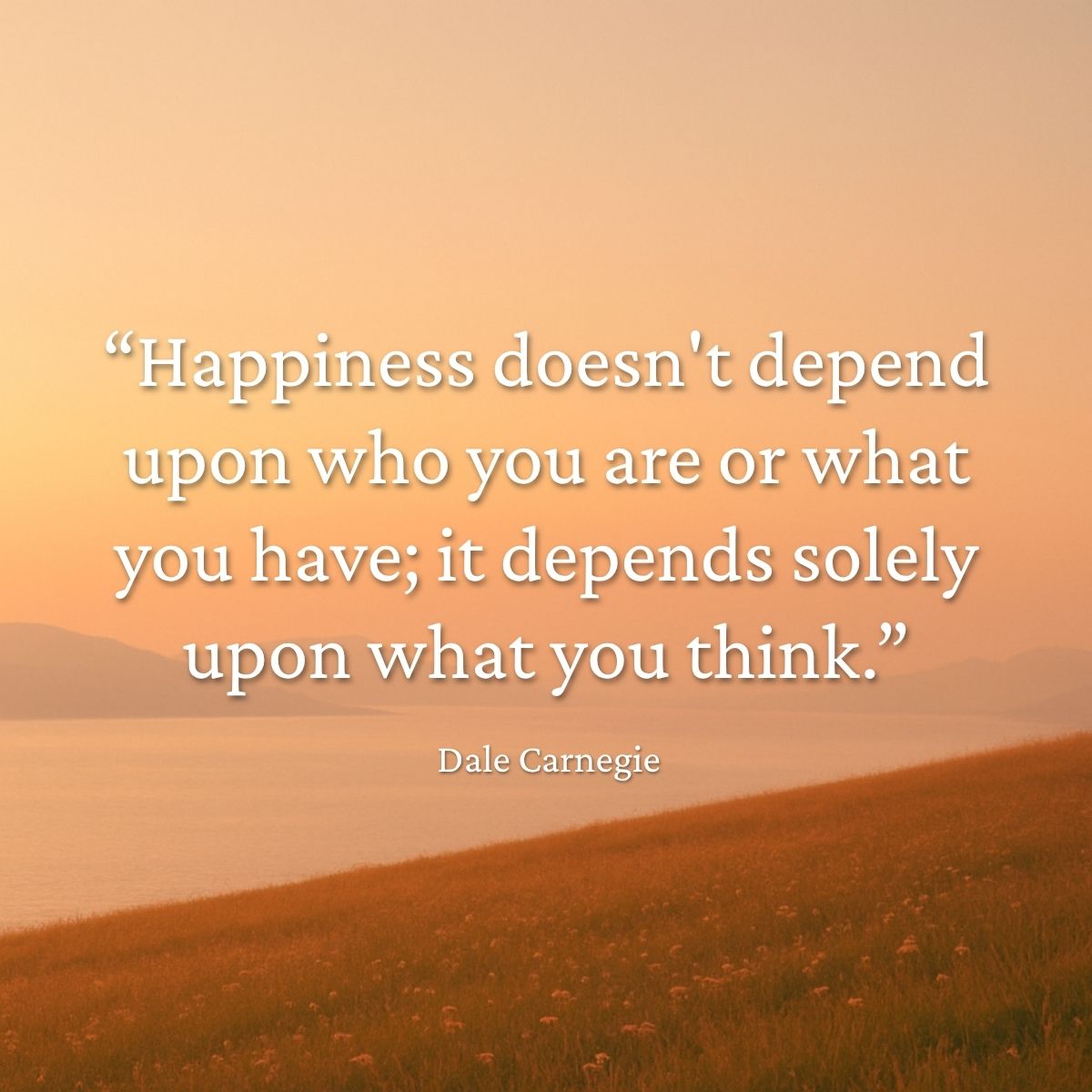By Dale Carnegie
Estimated reading time: 4 minutes
“Happiness doesn’t depend upon who you are or what you have; it depends solely upon what you think.” This powerful motivational quote about self-belief from Dale Carnegie strikes at the heart of what it means to find joy and meaning in life. Its impact goes beyond surface level, inviting us to pause and reflect on where real happiness comes from. The words carry a kind of practical wisdom—one that holds true when life is smooth and when things feel tough. Carnegie’s insight offers more than comfort: it offers a practical foundation for how we can approach each day.
What Does This Quote Mean?
Dale Carnegie’s quote gets to the core of happiness as an experience shaped by the mind, not by status, possessions, or circumstances. The motivational quote about self-belief is not only urging us to look within, but also reminding us that our thoughts set the emotional tone for our lives. When Carnegie says “happiness doesn’t depend upon who you are or what you have”, he is casting aside the idea that money, social standing, appearance, or life’s external markers carry the real weight. These things may offer fleeting comfort or pride, but they are not bankable sources of lasting joy.
At a deeper level, the message shines a light on the power of personal agency. If what we think determines our happiness, then we have a say in shaping our experience. The statement is not a denial of hardship, nor a suggestion to ignore challenges; it is an invitation to recognise that our interpretation — not the objective detail — is what most often colours our emotional world. What we choose to dwell on, our ability to find silver linings or purpose, and the way we frame our stories, all create the texture of our happiness.
This principle is as much about mental discipline as it is about optimism. It means that cultivating gratitude, acceptance, or hope through deliberate thought can shift how we feel, even if much around us stays the same. At its core, this quote is a call to develop a way of thinking that frees us from the ups and downs of circumstance, pointing gently toward self-awareness and inner strength.
How Can You Use This Quote in Life?
1. Reframing Setbacks
Instead of seeing a mistake or a failure as a fixed endpoint, practise the art of reframing. If you miss a promotion, struggle in studies, or have a personal disappointment, ask: “What can I learn here?” or “How might this help me grow?” This simple shift plants the seed for resilience. By deciding to view challenges as opportunities, you take charge of your inner well-being.
2. Cultivating Gratitude
Start or finish your day by listing three things, however small, that you feel thankful for. Maybe it’s a kind word, a good meal, or a moment of quiet. Regular gratitude practice changes your attention from what is lacking to what is present. Over time, this habit shapes a mindset where happiness is nurtured from inside, not chased in the world.
3. Choosing Your Focus
In everyday interactions, notice where your mind naturally goes. Are you drawn to what’s missing, or do you highlight the positive? When stuck in traffic, waiting in a queue, or dealing with a difficult person, focus on something positive: music you enjoy, a text from a friend, or the value of patience. This motivational quote about self-belief comes alive when you realise focus is a choice.
4. Letting Go of Comparison
Modern life tempts us to compare our jobs, looks, or lifestyles to others — especially on social media. This comparison is the enemy of inner peace. Instead, catch yourself when you fall into this mental trap. Remind yourself that happiness comes from your own standards and values, not from measuring up to someone else’s highlight reel.
5. Practising Self-Compassion
When your inner critic pipes up, try treating yourself as you would a close friend — with kindness and understanding. Notice your thoughts when you make mistakes and deliberately choose words that are supportive rather than harsh. Self-compassion creates an environment where happiness and contentment can flourish, unaffected by external events.
Each of these practices is a way to put Carnegie’s idea into motion in daily life. They push the focus from collecting new achievements or things, to training the mind and cultivating a more peaceful, contented state. The more you make these mental shifts, the less you rely on external sources for happiness — and the more you find it growing within.
✨ The Motivation Message
You hold the key to your own happiness — not your bank account, not your job title, not even what happened yesterday. It’s your inner world, the thoughts you let guide you, that shapes your mood and your future! When you choose to see the good, to practise gratitude, and to reframe the ordinary, you are flexing the most powerful muscle in life: your mindset.
Every day brings a chance to set the tone for how you feel. You may not control all the events life throws at you, but you are always in charge of your response. That’s the real magic! 🌟 Even on a tough day, you can pause, breathe, and choose a new thought. This is not about pretending things are perfect — it’s about giving yourself the power to make the best of the moment.
So, take that first step today: notice your thoughts, and steer them towards hope, kindness, and possibility. You have everything it takes. We believe in your ability to build happiness from the inside out! Why not test it out for yourself and see what changes?
About Dale Carnegie
Dale Carnegie, who was born in 1888 and died in 1955, was a groundbreaking American writer, lecturer, and self-development pioneer. Raised in rural Missouri, he was no stranger to hardship and hard work. His early experiences shaped a lifelong interest in understanding human behaviour and improving the quality of personal relationships. Carnegie became world famous for his practical books and courses, especially “How to Win Friends and Influence People”, a classic that remains popular to this day.
His worldview centred on the belief that attitude and mindset are the foundations of a fulfilling life. Carnegie encouraged people to focus on what they can control, to be curious about others, and to develop empathy. He believed anyone could improve their life and relationships by practising specific mental habits and social skills. The quote “Happiness doesn’t depend upon who you are or what you have; it depends solely upon what you think” is a clear reflection of his entire philosophy. Carnegie’s work continues to inspire people everywhere to search for happiness and success not outside, but in the way they choose to think and act.




